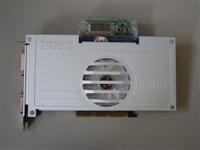Prolink Pixelview 5900XT Golden Limited
|



CLICK ANY IMAGE FOR AN ENLARGED VIEW
The most noticeable difference between this card and its predecessor (or most other manufacturer's 5900XTs, for that matter) would be the full-sized aluminum sheath that covers the entire front of the card. It fits flush with the mounting bracket, with an opening for the fan over the GPU, and two small openings at the other end of the card for the required power cables. The back side, however, is completely devoid of any components. Prolink's take on this sheath is that it will provide better cooling by creating a thermally conductive surface across the entire length of the card. The fan, which can spin as high as 5000 RPM, runs whisper quiet for the most part. In addition, the fan's rotation speed is dynamic, which means it runs at a lower RPM when the GPU is not being taxed, but it will automatically spin-up once a certain temperature is reached. Another notable difference is the extra set of pins and cabling that is used to monitor the temperature and fan speed on this card. A short cable runs from the connection on the card to the PDF II. And as we mentioned earlier, Prolink does provide a much longer cable for those interested in using the bracket, which can be installed in a vacant 5 1/4" drive bay.
We should also note that both the PDF II and GPU fan are lit up by blue LEDs, which add a little pizzazz to the card. The PDF II can also be mounted at 0, 45 and 90 degree angles, so the screen can be read whether the card is mounted horizontally or vertically. We've got some before and after pictures that show the PDF II in a well-lit room, and then again in the dark. Those blue LEDs are sure to turn some heads at the next LAN Party, and they allow for quick monitoring of the GPU temperature and fan-speed. It helps take the guesswork out of wondering whether or not the GPU is getting too hot when overclocking, which is of course something we'll be getting to a little bit later on.
|
|
|
Benchmark scores aren't the only way to compare |
1600x1200x32 - Maximum Quality Settings
| No AA | 2xAA |
 |
 |
| 4xAA | 8xAA |
 |
 |
Thief - Deadly Shadows revolves around the stealthy career of a master thief, usually slipping in and out of shadows. Thus, it's hard to find any spots in the game that are very well lit. The screenshots above are from the first mission of the game. Notice how the light thrown from the guard's torch illuminates the edges of the steps he stands upon. Without Anti-aliasing applied, or even when only 2X AA is enabled, the jaggedness of the steps is quite evident. When we increase the level of AA being applied to 4X and 8X, however, the jaggies in the stairs nearly disappear. Obviously, these kinds of optimizations can tax the card's performance quite severely, lowering frame-rates to unacceptable levels. With the Prolink Pixelview 5900XT though, we found that Thief was still quite playable at 1600x1200 with 4xAA enabled, without any major choppiness.
Splinter Cell 2 - Pandora Tomorrow Screenshots
1600x1200x32 - Maximum Quality Settings
For our second round of screenshots, we decided to put up some eye-candy from a FPS called Splinter Cell 2 - Pandora Tomorrow. Again, we set the resolution to 1600x1200, with 4xAA and 8x Anisotropic Filtering enabled. Except for some occasional slowdowns on the jungle scene, we were also able to move smoothly around these levels. These are superbly drawn scenes, that easily could have gone down as "in-game" cut scenes a couple of years ago.
















